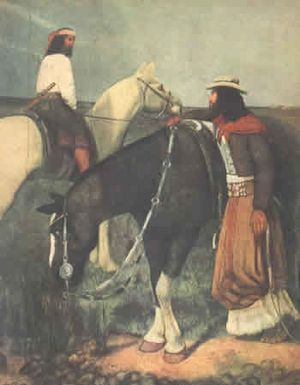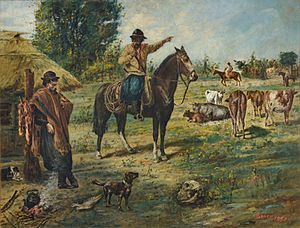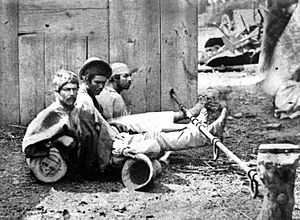Peon facts for kids
A peon (say "PEE-on") is a person who is forced to work without much control over their job or pay. This system is called peonage. It's a type of forced labor or economic unfairness. The word "peon" comes from the Spanish word peón, which means "foot soldier."
Peonage was common during the time when European countries took over lands in Latin America. It also happened in the United States after slavery ended. Laws called "Black Codes" were used to make African Americans work, even though they were supposed to be free.
Contents
What Does "Peon" Mean Today?
The word "peon" can have a few meanings. It often describes someone with very little power. This person might be given simple tasks or be bossed around unfairly.
Here are some ways "peon" is used:
- In parts of South Asia, a peon is like an office helper. They do small jobs or act as an attendant.
- In Shanghai, China, some people use it for a worker who has little power. This worker might face unfair treatment from their bosses.
- In financial trading, a "peon" is someone who trades small amounts of money.
However, the word "peon" has a serious historical meaning. It refers to people forced into labor. This often involved debt bondage, where people had to work to pay off a debt.
History of Peonage
Peonage began during the Spanish conquest of Mexico and the Caribbean islands. The Spanish rulers forced native people to work on farms and in mines. This system was very common in Latin American countries like Mexico, Guatemala, Ecuador, and Peru.
Peonage in the United States
After the American Civil War (1861–1865), peonage grew in the Southern United States. Many poor white farmers and newly freed African Americans (called freedmen) did not own land. They would farm another person's land. This system was known as sharecropping.
At first, sharecropping seemed fair. Landowners would pay for seeds and tools. In return, they got a share of the crops or money from the harvest. But over time, many landowners took advantage of this system.
They forced sharecroppers to buy supplies from their own stores. These stores often had very high prices. Many sharecroppers could not read or write. They had to trust the landowner's records. Landowners would also add hidden costs. They would "miscalculate" the profits from the harvest. This kept sharecroppers always owing money to the landowner. Because of these debts, farmers were forced to keep working without truly being free. Bad weather, like droughts, also made farmers fall deeper into debt.
Black Codes and Forced Labor
After the Civil War, Southern states passed "Black Codes." These laws were meant to control newly freed Black people. One type of law was called a "vagrancy law." If African Americans were homeless or unemployed, they could be arrested and fined. Since most could not pay the fine, they were sent to work for the county. Or, they were hired out to private businesses. This was part of a system where prisoners were "leased" for labor.
Local officials arrested thousands of people, mostly Black freedmen. Poor white people were also arrested, but in smaller numbers. White business owners could pay these debts. Then, the prisoner had to work off the debt for them. These prisoners were forced to work in mines, lumber camps, on railroads, and on farms. The money from their labor went to the states. The businesses that leased the workers often treated them badly. This system of forced labor continued for decades, even into the 20th century.
Ending Peonage
Southern states and private businesses made money from this unpaid labor. It's thought that by the early 1900s, up to 40% of Black people in the South were trapped in peonage. Workers were often abused by their bosses.
The Thirteenth Amendment to the U.S. Constitution banned forced labor, except as punishment for a crime. The U.S. Congress also passed laws to protect the rights of Black people. These laws made it illegal to violate those rights. However, sharecroppers in Southern states were still forced to work to pay off old debts or taxes. This continued until President Lyndon B. Johnson officially ended involuntary servitude in 1966.
See also
 In Spanish: Peonaje para niños
In Spanish: Peonaje para niños
- Critique of work
- Day labor
- Debt bondage
- Extortion
- Fagging
- Feudalism
- Peasant
- Proletariat
- Serfdom
- Hodges v. United States, 203 U.S. 1 (1906)
- Bailey v. Alabama, 219 U.S. 219 (1911)
- Boy Slaves (1939 film)
- Mary Grace Quackenbos, federal attorney who investigated peonage in the United States in the early 1900s
 | Calvin Brent |
 | Walter T. Bailey |
 | Martha Cassell Thompson |
 | Alberta Jeannette Cassell |




